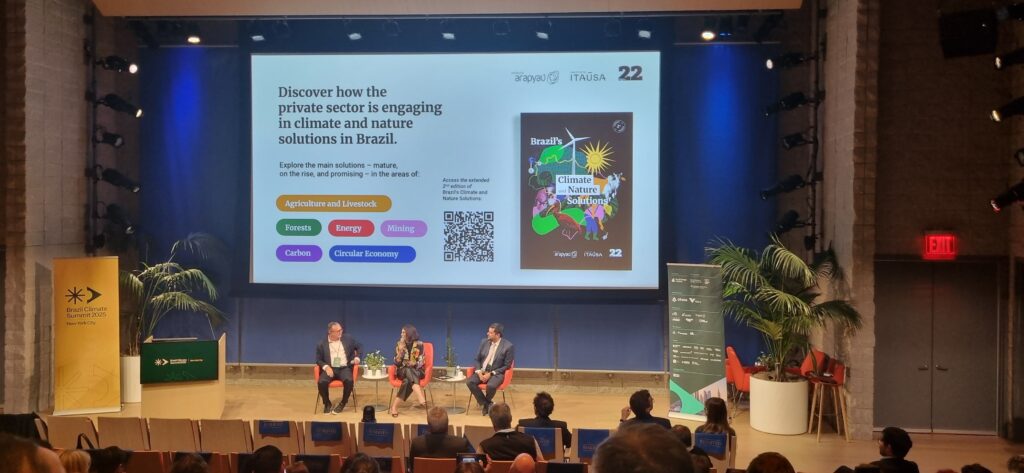
We launched the 2nd edition of the Brazil’s Climate and Nature Solutions report in New York, featuring new chapters on Mining and Carbon.
Credit: Arapyaú Collection.
The growing demand for critical minerals needed for the energy transition and the consolidation of carbon markets as a key climate policy instrument motivated the inclusion of these themes in the second edition of the Brazil’s Climate and Nature Solutions report, developed by the Arapyaú Institute in partnership with Instituto Itaúsa and Página22. Following the first edition launched during the London Climate Action Week, the new version — presented during New York Climate Week in September — broadened its scope by adding chapters on Mining and Carbon, alongside Agriculture and Livestock, Forests, Energy, and Circular Economy.
Based on over 100 interviews and research studies, the report brings together mature, emerging, and promising solutions, reinforcing Brazil’s role as a leader in building a new green economy. In the case of mining, the study points out that the challenge will be to expand production of these critical minerals without increasing social and environmental impacts. Among the solutions highlighted are energy-efficiency gains that reduce emissions, the adoption of 100% renewable energy in production processes, and innovative techniques for restoring mined areas.
The Carbon section shows that Brazil has unique conditions to establish itself as a global reference in this field, as it already leads the voluntary carbon market in South America — holding 40% of carbon credit projects and 25.6% of the region’s annual emission reductions, according to the Brazil NBS Alliance. Successful experiences, such as the Reducing Emissions from Deforestation and Forest Degradation (REDD) projects — focused on forest conservation and sustainable management — and REDD+, which adds positive social impact for local communities such as Indigenous and quilombola groups, further reinforce this leadership. Another major initiative is the Decarbonization Credits (CBIOs) from RenovaBio, designed as financial assets issued by ethanol or biodiesel producers who demonstrate greenhouse gas reductions.
Companies like re.green, which has already planted millions of seedlings in degraded areas, illustrate the sector’s potential. Its contracts with Microsoft and Nestlé foresee the generation of millions of carbon credits over the coming decades. In 2024, for instance, Microsoft announced the purchase of three million tons and three million credits over a 15-year period.
“These concrete examples gathered in the Climate and Nature Solutions from Brazil report show that Brazil not only has the resources and expertise but is already developing business models that can be scaled globally,” says Renata Piazzon, CEO of the Arapyaú Institute.
The new legal framework for the regulated carbon market — approved in 2024 and currently under regulation — is expected to further boost the sector, alongside the implementation of Article 6.4 of the Paris Agreement, which will enable international trading of credits. “Brazil is strategically positioned to lead both the voluntary and regulated markets, combining natural advantages with public policy and innovation,” comments Lívia Pagotto, Institutional Director at Arapyaú.
“The country has all the characteristics to be part of the leadership of a new regenerative, inclusive, low-carbon, and future-oriented economy,” concludes Marcelo Furtado, Head of Sustainability at Itaúsa and Executive Director of Instituto Itaúsa.